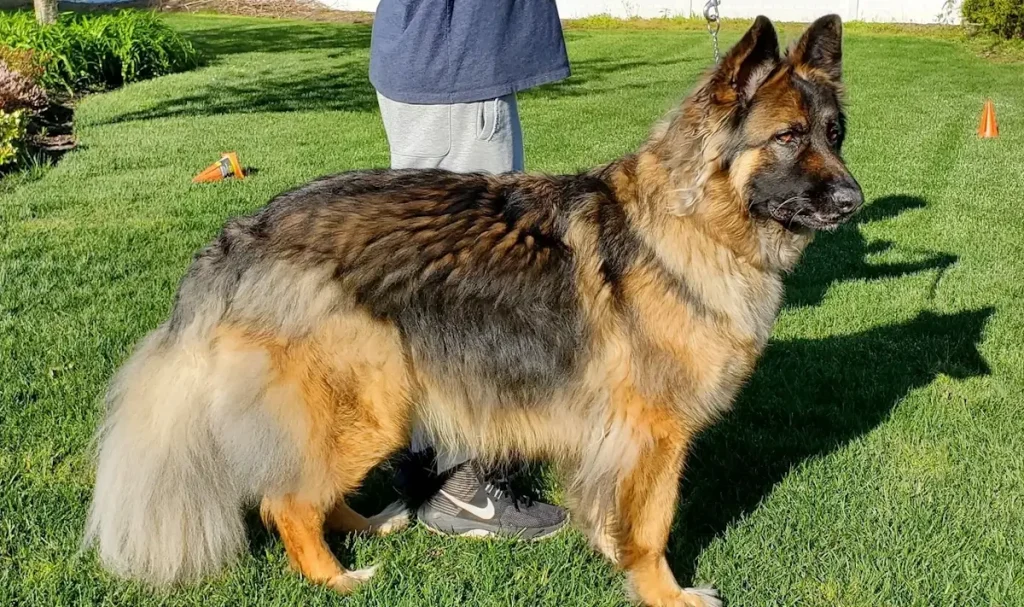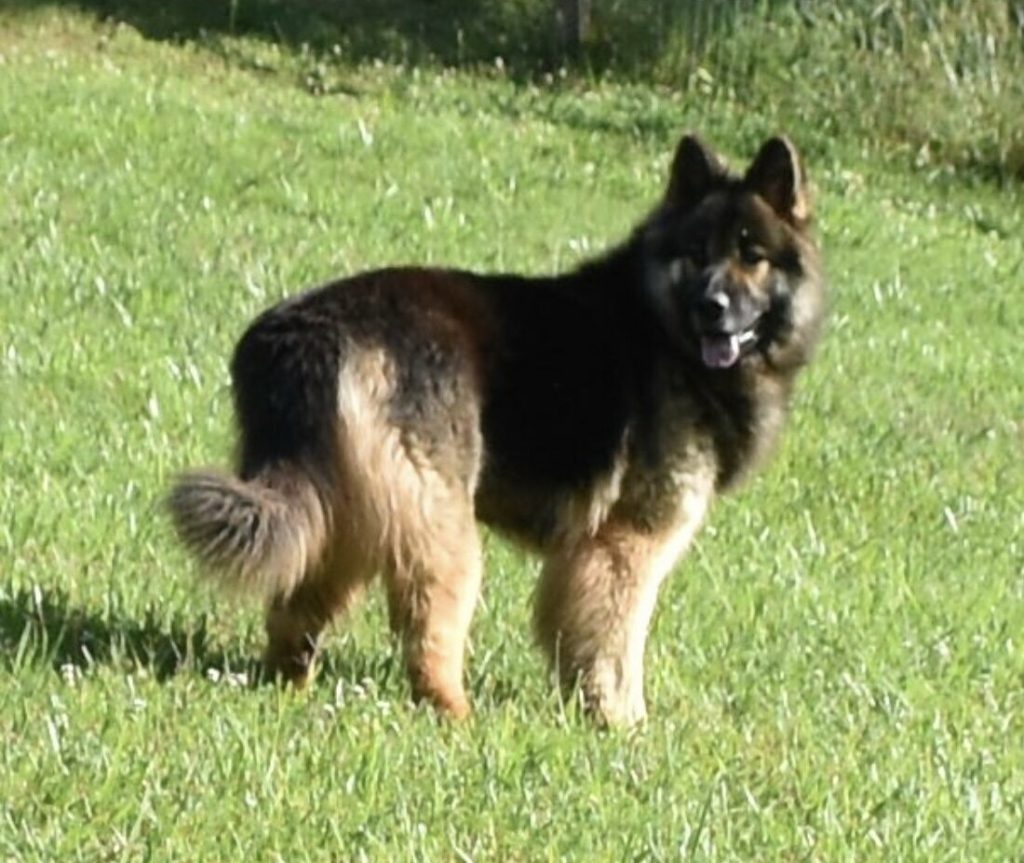As you adjust the dial on your radio, hoping to tune into the world of large dog breeds, the King Shepherd’s name resounds with an almost regal echo. This breed, a relatively modern amalgam that harkens back to the old-world shepherds of yore, stands out with its noble stature and balanced demeanor.
You might find their traits reminiscent of the classic German Shepherd, yet they present with their unique blend of calm assurance and protective instinct. As a King Shepherd’s potential companion, you’re likely to appreciate their intelligence and eagerness to please, making them trainable and deeply loyal.
But before you consider opening your home to such a majestic creature, it’s imperative to understand the full spectrum of their temperament and care needs. What exactly sets them apart from their forebearers, and why might they fit your lifestyle perfectly? The answers lie ahead as we explore the nuances defining King Shepherd’s place within the canine kingdom.
King Shepherd: Traits, Temperament, and Care Guide
With its calm and adaptable personality, the King Shepherd is ideally suited for life in a single-family home with ample outdoor space. As a large and intelligent member of the relatively new category of hybrid dogs, this breed is eager to please and integrates well into family life. They exhibit a protective instinct yet remain gentle with children, establishing a sense of belonging and safety within the household.
However, the King Shepherd breed requires consistent mental stimulation and physical exercise, at least one hour daily, to prevent destructive behavior. Moreover, they’re prone to hip dysplasia, necessitating regular health screenings. Grooming is essential; brushing your dog weekly will manage shedding and prevent skin allergies.
- Noise Level
- Energy
- Sociability
- Trainability
- Care
- Health
Overall
Summary
The King Shepherd is a breed known for its moderate noise level, high energy, strong sociability, good trainability, moderate care requirements, and overall good health.
Exploring the Characteristics of the King Shepherd
Delving into the characteristics of King Shepherds, you’ll find that their intelligence and trainability stand out, making them a top choice for dedicated owners who can provide structured training and ample exercise. As a large breed, they have a calm and adaptable temperament, crucial for those seeking a dog that easily fits into family life. However, they’re not just gentle giants; they need consistent mental stimulation to prevent destructive behaviors.
| Traits | Health Issues | Exercise & Mental Stimulation |
|---|---|---|
| Intelligent, Easy to Train | Hip/Elbow Dysplasia | Minimum 1 Hour/Day |
| Gentle with Children/Pets | von Willebrand Disease | Structured Training |
| Adaptable, Calm Temperament | Hypothyroidism, Eye Issues | Prevents Destructiveness |
This hybrid breed’s double coats mean it’s designed for colder climates, but it also implies significant grooming responsibilities. Always be mindful of the health issues prevalent in the breed and ensure you’re equipped to meet its needs.
King Shepherd: A Comprehensive Profile and Guide
As you consider the King Shepherd for your next canine companion, it’s crucial to understand their comprehensive profile.
This breed exhibits a blend of robust physicality and a stable, pleasant temperament, necessitating a tailored approach to their care.
Analyzing their needs, from space requirements to health considerations, ensures a harmonious match with your lifestyle.
Everything You Need to Know
Understanding the King Shepherd’s origins and characteristics is essential if you consider this hybrid breed as a new family member or working companion. As highly intelligent dogs, they thrive on:
- Socialization:
- Exposure to various situations ensures adaptability.
- Prevents anxiety and promotes a well-rounded temperament.
- Training:
- Their intelligence demands mental stimulation.
- Ideal for roles as guard dogs or working dogs.
- Health & Care:
- Regular exercise to mitigate potential joint issues.
- Prone to certain health issues, so proactive veterinary care is crucial.
These large breeds require a commitment to their physical and mental needs. With proper care, King Shepherds exhibit traits of loyalty and protectiveness, making them exemplary companions. Ensure you’re equipped to nurture their development and address their health predispositions.
Discovering the Temperament
The King Shepherd’s temperament is characterized by its self-assurance and stable demeanor, making it reliable and intelligent. King shepherds typically exhibit a blend of courage and friendliness, traits highly prized in a Shepherd Dog. As members of your family, these dogs bring a sense of belonging, and their loyalty embody the very essence of the Breed.
The King Shepherd Club acknowledges that these shepherds are highly intelligent animals, thriving on positive reinforcement to foster their natural eagerness to please. King shepherds are generally amiable towards strangers and show a protective yet discerning attitude, making them a great choice for those who value security and companionship. These highly intelligent dogs mesh well with children, other pets, and their overall community when socialized appropriately.

King Shepherd: Is It a Good Fit for Families?
When considering a King Shepherd as a family pet, you must evaluate their compatibility with your household dynamics.
Their calm disposition and affinity for children position them well within family settings, yet their need for daily vigorous exercise demands an active lifestyle commitment.
It’s crucial to balance their grooming needs and intelligent, trainable nature against your family’s ability to provide consistent care and stimulation.
Assessing King Shepherd’s Compatibility with Families and Kids
Assessing a King Shepherd’s compatibility with family life hinges on recognizing their need for companionship and space, alongside their gentle nature with children. These large and giant breeds thrive in environments where they can form strong bonds with family members, including kids. Their temperament is naturally protective, yet they’re patient and great with kids, especially when early socialization is introduced.
- Home Environment
- Fenced-in outdoor space: essential for exercise
- Daily routines: families must have time to engage with their King Shepherd
- Interactions with Children
- Gentle and patient: King Shepherds are known for being loving with children
- Supervision: always recommended, despite their gentle nature
- Family Lifestyle
- Energetic breed: requires families prepared for an active dog
- Grooming: considerable upkeep needed due to size and coat
Before welcoming a King Shepherd into your home, ensure your lifestyle aligns with their needs for a harmonious family dynamic.
King Shepherd Flexibility
King Shepherds exhibit remarkable adaptability, thriving in spacious homes and smaller apartments as long as their exercise and mental engagement needs are met. As a large dog, the King Shepherd was developed by breeders Shelley Watts-Cross and David Turkheimer, who aimed to create a breed combining the best traits of German Shepherds, Great Pyrenees, and Alaskan malamutes. These king shepherds can become restless without adequate space or stimulation, emphasizing the need for physical activity.
The American Rare Breed Association recognizes the King Shepherd’s versatility in the United States. However, they’re prone to certain health issues, making proper care and a supportive community essential. Your commitment to their well-being ensures they remain a flexible and cherished companion.
Obedience Tips for King Shepherds

As you train your King Shepherd, beginning with basic obedience commands early in their development is crucial.
Positive reinforcement is an effective strategy, capitalizing on their keen intelligence and eagerness to please.
To prevent the onset of unwanted behaviors, ensure you’re providing ample mental and physical challenges daily.
Effective Training Strategies
To harness a King Shepherd’s intelligence and trainability effectively, begin their obedience training during puppyhood and maintain it as a constant throughout their life. As someone interested in adopting a large dog, you’ll need a lot of patience and consistency to ensure your King Shepherd puppy grows into a generally healthy and well-behaved adult. Strenuous activity should wait until they’re older, but you can start simple dog training exercises as early as a few weeks of age.
| Training Strategy | Description | Age to Implement |
|---|---|---|
| Positive Reinforcement | Rewards-based system to encourage desired behavior | From 8 weeks |
| Mental Stimulation | Activities to challenge their mind and prevent boredom | Early puppyhood |
| Consistent Leadership | Clear boundaries and leadership for respect and trust | Throughout life |
| Socialization | Exposure to various stimuli to ensure good behavior around others | As early as possible |
Exercise and Grooming Needs
Requiring at least an hour of vigorous exercise daily, King Shepherds are best suited to environments where they can freely roam and play. As a breed with deep chests and limbs carried erect, these shepherds need plenty of space to prevent weight gain and ensure mental stimulation. Without an outlet for their energy, they may become bored and destructive.
Brushing your dog several times a week is essential to remove dead hair and manage loose hair. It’s not just about aesthetics; it’s about your dog’s health and comfort. Grooming should be meticulous, as these dogs spend lots of time outdoors. Regular ear checks, teeth cleaning, and nail trimming complement the exercise and grooming needs, preserving your King Shepherd’s majestic appearance and vitality.
Health Considerations
When considering a King Shepherd’s health, be aware that they’re susceptible to several hereditary conditions, including hip dysplasia and bloat.
Their lifespan often reflects the quality of care they receive, highlighting the importance of early screening for genetic diseases.
Proper diet, exercise, and consistent veterinary oversight can mitigate some health risks and contribute to a longer, healthier life for your dog.
Common Health Issues and Lifespan
While King Shepherds are generally robust dogs, they’re susceptible to certain health issues such as elbow and hip dysplasia, von Willebrand disease, and hypothyroidism, which warrant careful monitoring and preventive care throughout their lives. As you immerse yourself in the King Shepherd community, it’s essential to understand these common health concerns.
Despite the breed’s overall vigor, genetic health problems can occur. Breeders like David Turkheimer and Shelley Watts-Cross have worked to mitigate these risks, striving for fewer health issues through careful selection.
Gastric dilatation, commonly known as bloat, is another concern, making it imperative to maintain a feeding schedule that promotes digestive health.
Regular veterinary visits and proactive care are pivotal in managing your King Shepherd’s health, potentially extending their lifespan and enhancing their quality of life.
The American King Shepherd Club recognizes this breed’s well-being as a shared commitment among owners and breeders alike. Their average lifespans range from 10 – 13 years
Is King Shepherd the Right Dog for You?
Considering the specific needs and characteristics of the King Shepherd, you must assess whether this breed’s temperament and care requirements align with your lifestyle and home environment.
When adopting a King Shepherd, it’s important to note their necessity for space and exercise; they’re not suited to live in an apartment. As descendants of the German Shepherd, they need firm training and socialization.
Membership in a breed club, like the American King Shepherd Club or the Rare Breed Dog Club, can provide valuable resources for novice owners. King Shepherds offer emotional support and are typically not aggressive dogs, yet their size and energy demand an owner who can provide consistent leadership and companionship.
Ensure your home can cater to their physical and emotional needs before you commit.
Conclusion
In conclusion, despite their regal name and imposing size, King Shepherds may just overthrow your preconceptions. They’re not the aloof sovereigns of the canine realm; they’re teddy bears at heart, craving your company more than a throne.
As a King Shepherd owner, you’ll learn that their intelligence and loyalty come with a clingy side. So, if you’re seeking a low-maintenance loner, this breed is, ironically, the antithesis of what you need.
